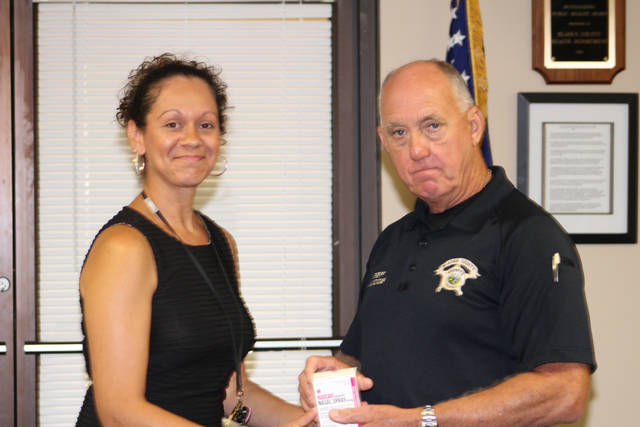ELIZABETHTOWN — In Bladen County, leaders of various organizations have been combating the growing opioid epidemic with the resources within their agencies, but virtually working in isolation. All that changed Tuesday, when department heads convened to, for the first time, draw on one another’s wisdom and experience, in the hopes of eradicating the problem.
At the Department of Health and Human Services, and at the behest of the county commissioners and the Bladen County Health Department, gathered the heads or leaders of many agencies involved in the prevention, education, or treatment of drug addiction. Present were Health and Human Services Director David Howard; county Commissioners Charles Peterson, Ray Britt, and Russell Priest; county manager Greg Martin; Sheriff Jim McVicker, as well as Bladen County Sheriff’s Office narcotics investigator Richard Allen; Bladen Baptist associational missionary David Foster and Good News Baptist Church pastor Larry Hayes; Assistant District Attorney Quentin McGee; Bladen Journal editor W. Curt Vincent; Bladen Community College vice-president of continuing education Sondra Guyton; Bladen County Schools student services director Robert Heavenridge; and two Eastpointe representatives.
“As you know, this nationwide epidemic is a significant health problem that affects our citizens and neighbors without regard to age or race,” Peterson began the meeting. “We’re taking this matter seriously, and Bladen County commissioners are willing to take a leadership role in engaging our local leaders and planning what to do.”
The purpose of the day’s meeting was to plan a community forum. Before doing so, however, attendees spent time talking about the opioid epidemic. North Carolina was recently identified as having four of the worst 18 cities in the country for opioid abuse, with Bladen County sandwiched between two of them — Wilmington, which is No. 1, and Fayetteville, which is No. 18. In fact, statewide, the Mother County is eclipsed only by 20 other counties with regard to the number of prescriptions written per resident, and by 19 other counties in terms of the number of pills per resident (101.1 for each person in 2016).
“We are definitely on the high side, and this is a very serious issue,” said Martin.
“My budget for buying back drugs is (x amount), and I’ll probably be out by December,” said Allen. “I can’t buy them back as often as they’re being sold.”
Howard pointed out that even if the supply were cut by three-quarters, doing so would only give rise to the problem addicts would be facing with lack of affordable treatment.
McGee suggested that perhaps education would eliminate some of the problem.
“If somebody comes in with a broken leg, they trust the doctor,” he commented. “If the doctor tells them (about the possibility for addiction), maybe it will scare some of them off or at least cause them to ask their doctor if they really need the medication. If you cut it off on the front end, there will be fewer addicts in the long run.”
After also discussing the events that led to the rise of the opioid problem and harm prevention strategies, participants turned to who needed to be included in an upcoming forum.
“I think we need to hear from private physicians,” suggested McGee. “We may be inviting them to be a whipping boy, but anybody who upholds the Hippocratic Oath should be willing to be part of the solution. If they’re not willing, maybe there’s a reason for that as well.”
Others suggested various stakeholders such as those in the business/industry sector, church leaders, former drug addicts, a rehabilitation center administrator, pharmacists, principals, and mental/behavioral health providers.
“We all see this from different angles, and the whole point is to to be able to look at the problem from all angles so we can see how to solve it,” Howard remarked.
The 2½-to-three-hour forum, which will be open to invitees only, will be held Tuesday, Sept. 12, at 2 p.m. at Bladen Community College. The working meeting will give participants the opportunity to voice concerns and suggest solutions, after which committees will be formed to address the topics.
Chrysta Carroll can be reached by calling 910-862-4163 or emailing ccarroll@s24515.p831.sites.pressdns.com.


